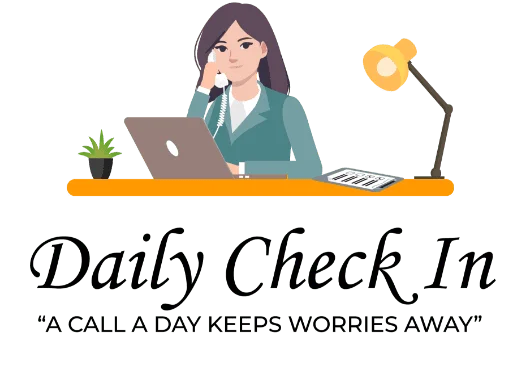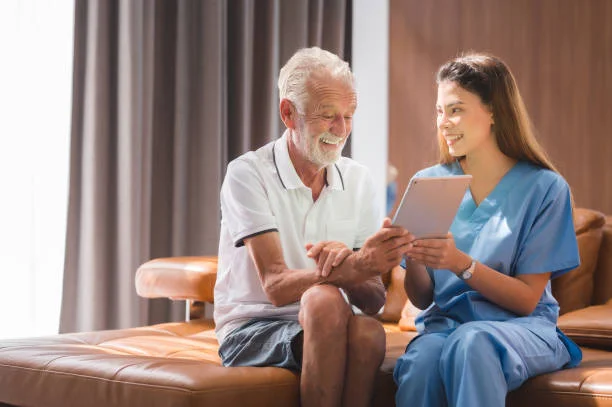Caring for elderly individuals goes beyond simply scheduling a doctor’s appointment. There should be routine follow-ups to ensure that their health and well-being is in constant monitoring. Senior primary care aims to provide ongoing support to seniors with regular medical assistance, emotional support, and assistance with their daily routine and tasks. However, lack of immediate medical response and gap in communication can make senior care a more challenging task, especially for those who are living in assisted living facilities or alone.
This is where Daily Check In services can help. A well-structured program like Daily Check-In has provided a solution through organized systems that include scheduled wellness calls, routine health assessments, and medicine dosage reminders. These tools help patients manage their health while reducing the burden on caregivers.
These services encompass the reduction of hospital formations and emotional support, or care generated from prevention measures. These are the aspects where the check-in system is improving the general conditions in which elderly people are taken care of. In this article, we will focus on how this system can improve senior primary care, the advantages of having medicine dosage reminders, and the significance of Daily Check-In service on elderly people.
The Role of Daily Check-Ins in Senior Primary Care
Daily check-in services function as a safety precaution for elderly individuals wherein they are assured of getting medical attention, emotional support, medication reminders, and timely intervention if any health concerns arise. A good number of elderly patients experience chronic conditions which require regular monitoring, yet their doctor’s appointments, medication intake, or both get missed. Without proper check-in structures, small health concerns can quickly transform into bigger medical emergencies.
With these Daily Check-In services, monitoring and reporting edges closer to achieving health goals through the following:
- Consistent Health Monitoring: Seniors get messages or calls on a daily basis to assess their health conditions.
- Medication Adherence: Automated alerts assist elderly patients to take their prescribed medications promptly.
- Immediate Alerts for Caregivers: If an elderly patient does not respond, caregivers or health providers are instantly notified, and an emergency medical assistance team is dispatched.
Integrating check-in services with senior primary care will not only enhance health management for older adults but will also provide peace of mind to caregivers and mitigate the risks of arising medical emergencies.
How Check-In Services Improve Medication Adherence
Medication non-adherence stands to be one of the most pressing and challenging issues in elderly healthcare. As uncontrolled chronic conditions, increased hospitalizations, and declining cognitive health can all stem from missed doses, and the consequences speak for themselves. Luckily, check-in services offer various benefits of medication reminders which significantly reduce health risks in senior patients.
How Medication Reminders Help Seniors
- Scheduled Notifications – Seniors receive reminders through phone calls or automated messages.
- Real-Time Tracking – Caregivers can monitor and keep track of the medication intake of the elderly patients.
- Reduced Health Risks – Strict adherence and monitoring to medicine intake also reduce medical complications and possibilities of emergency interventions and hospitalization.
Majority of elderly patients struggle to understand and follow their prescription instructions because of having conditions like confusion, memory loss or simply failing to develop habits or routine due to age. By using services such as Daily Check-In, elderly patients can be assured that their health remains stable as they will receive regular reminders regarding their medication.
The Emotional and Psychological Benefits of Daily Check-Ins
Physical health is not the only concern for senior emotional well-being, it is equally important. Many elderly individuals experience social isolation, which can lead to depression, anxiety, and cognitive decline.
Daily check-ins provide:
- A Friendly Connection: Seniors feel heard, valued, and less lonely.
- Emotional Stability: Regular interactions boost mental well-being.
- Increased Cognitive Engagement: Conversations stimulate memory and thinking skills.
Studies show that seniors with consistent social interaction experience lower rates of depression and better overall health. A simple daily call can brighten their day, reinforce their sense of importance, and provide a much-needed routine.
Daily Check In ensures that seniors receive not just a health check-up, but also a compassionate conversation, improving both their emotional and mental health.
Preventing Emergencies with Daily Monitoring
Medical emergencies among seniors often arise from warning signs that go unnoticed such as dehydration, dizziness, unmanaged pain or skipped medications. Daily check-in services act as early warning systems, which allow caregivers to timely address the concern before they escalate to become serious health issues.
How Check-Ins Prevent Emergencies
- Identifying Warning Signs Early – It notices and identifies any changes in speech, discomfort, confusion, fatigue etc. and flag it for follow-up calls.
- Immediate Response Protocols –Emergency contacts, caregiver and healthcare staff notifies immediately, if a senior does not respond to the check in calls.
- Proactive Health Management – Routine wellness inquiries also help in timely identifying and potential health risk while reducing chances of emergencies and hospitalizations.
For elderly patients who are living alone, daily check-in calls can make a huge difference by preventing them from any medical crisis through timely intervention. Integrating structured check in monitoring systems makes senior primary care more efficient and proactive, while ensuring timely care and preventing chances of hospitalization.
The Importance of Daily Check-Ins in Assisted Living Facilities
Nursing homes and assisted senior care centers can reap immense benefits from daily check-in services. Usually, each staff member has multiple residents to look after, which makes it difficult for them to provide individualized care and attention. In such a situation, daily check-in services play a vital role in bridging the gap while providing an additional layer of efficiency and safety to the staff and patients respectively.
Key Benefits for Elderly Care Facilities
- Improved Resident Safety – Daily check-in services ensure that no resident is forgotten or overlooked.
- Reduced Staff Workload – It also helps staff to focus on emergency medical needs, because routine wellness checks are taken care of by check in services.
- Family Reassurance – Resident’s families and their loved ones always stay informed about the health status and medical conditions of their senior’s patient.
Integrating daily check-in services in elderly care facilities make the system more secure, responsive, personalized and streamlined, while also ensuring that every resident receives the individual attention and care they deserve.
Final Thoughts: Strengthening Senior Primary Care with Daily Check-Ins
Daily Check-In services are based on a broad spectrum of senior care models which serve beyond the simple objective of health monitoring. Instead, it creates a proactive structure which ensures their safety, health and emotional well-being and strict medication adherence. By incorporating Daily check-ins into senior care, families, caregivers and senior care facilities can get a compassionate, reliable and an efficient system to support and monitor elderly patients.
Comprehensive solutions like Daily Check In enable seniors to live their life in a more fulfilling and independent way, without compromising on their safety and well-being. Such services not only provide mental peace for the families and caregivers but also reduce the risk of hospitalization and medical emergencies.
If you want to know more about how Daily Check In services can improve senior care health management, then visit Daily Check In today to get tailored solutions personalized to your needs, to ensure consistency, safety and wellbeing of your loved ones.
Frequently Asked Questions
Check-in calls are basically automated messages and calls that can also be personalized as per patient’s needs and requirements. Check-in calls are meant to remind patients to take their medications and meals on time, while also inquiring about their medical condition, health issues and overall well-being. In case an elderly person does not respond or signals to check-in call, a swift emergency response is generated by informing healthcare staff and caregivers.
Absolutely. Daily call services have no restrictions on their use for various care categories like independent and assisted living, as well as full time nursing homes. Daily Check-in ensures that individual and facility requirements are met with flexible and effective solutions to meet facility and individual needs.
If a senior misses the scheduled check-in call or message, the system instantly triggers an emergency alert, which notifies healthcare staff, emergency contacts and the caregivers. To ensure senior’s safety, some services also allow automatic follow-up text reminders or calls.






